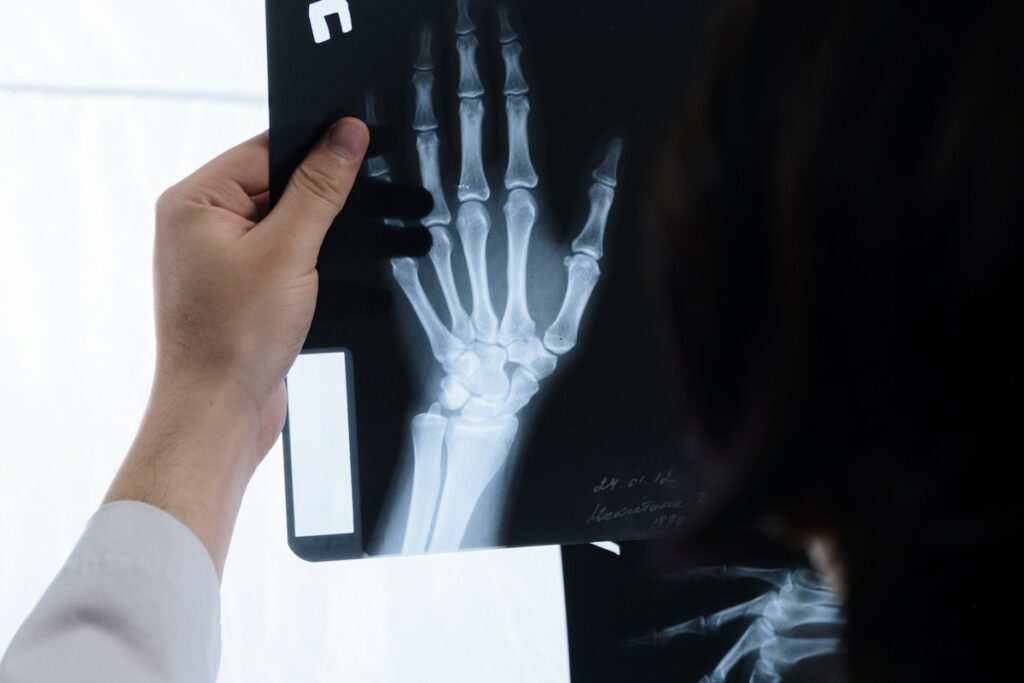- Consuming calcium and vitamin D-rich foods and regularly exercising can significantly enhance bone health.
- Smoking cessation and moderate alcohol intake are essential to prevent bone tissue damage and maintain bone mass.
- Maintaining oral hygiene and regular dental check-ups can prevent bone degradation linked to periodontal disease and tooth loss.
- Regular health check-ups aid early detection of bone problems, ensuring timely intervention and treatment.
As you go about your daily activities, how much do you think about caring for your bones? If you’re not careful, you could injure your bones in ways that could seriously affect your health. Bone health is essential, and maintaining it is vital for living a healthy, pain-free life, especially in old age. This blog will discuss essential things you need to know to keep your bones strong and healthy.
Watch your diet.
The food you consume plays a significant role in the health of your bones. For strong, healthy bones, ensure that you consume enough calcium and vitamin D. Calcium strengthens bones and teeth, while vitamin D helps the body absorb calcium. Dairy products like milk, cheese, yogurt, nuts, and green leafy vegetables like broccoli and kale are calcium-rich. Vitamin D can be found in oily fish, egg yolks, and fortified cereals.
Exercise regularly.
Exercise is another crucial factor that contributes to bone strength. To ensure you are getting the most benefit from physical activity, choose activities that put stress on your bones, such as the following four:
Weight-bearing exercises.
Weight-bearing exercises such as running, walking, and aerobics increase bone density and strength. The impacts from these types of activities stimulate the body to produce new bone cells, which in turn makes bones denser and stronger.
Resistance exercises.
Resistance exercises help build strong muscles and ligaments that support bones and hold them together. Exercises like weightlifting, push-ups, triceps dips, lunges, and squats work out muscles to increase bone strength.
Balance and coordination exercises.
Balance and coordination exercises help improve muscle control which is essential for preventing falls that could lead to fractures or broken bones. Activities like Pilates, tai chi, step aerobics, yoga, and dancing are all good options.
Stretching exercises.
Stretching exercises improve flexibility, which is key for reducing your risk of injury. Activities like yoga and Pilates help loosen tight muscles and reduce stiffness in the joints, protecting them from trauma-induced injuries.
If you aren’t physically active, it’s advisable to start slow and gradually increase your activity levels. However, if you have any health concerns, consult your doctor before embarking on any exercise regimen.
Quit smoking.
Smoking is bad for you in many ways, and it is also not ideal for bone health. Studies have linked smoking with fragile bones and a higher chance of bone fractures. Smoking harms bone tissue and can lead to irreversible bone loss. So, if you smoke, quitting should be on your list of priorities.
Limit alcohol intake.
Too much alcohol can increase the risk of bone disease. Excessive drinking can reduce bone mass, disrupt the body’s calcium balance and affect your ability to absorb vitamin D. To maintain the health of your bones, limit alcohol intake to moderate levels.
Take care of your dental health.
Your dental health can also affect your bone health. Poor oral hygiene may increase the risk of periodontal disease linked to weak bones and bone loss in adults. Tooth loss can also impact bone health. When you lose a tooth, the jawbone in that area no longer receives the normal stimulatory forces from daily chewing. As a result, the jawbone deteriorates.
So make sure you brush your teeth twice a day and visit the dentist for regular check-ups. A good dentist will be able to help you address dental issues that could affect your overall bone health. For example, they can give you dental implants if you have lost teeth to prevent bone loss. Dental implants also have the added benefit of improving your appearance.
Get regular check-ups.
It’s essential to have regular check-ups with your doctor or healthcare provider, especially as you age. These check-ups will help detect any bone problems, and early detection can prevent more severe issues down the line.
Bone health is a vital aspect of our overall well-being that we often overlook. It’s not just about avoiding fractures and osteoporosis but about maintaining a healthy, active, and fulfilling life as you age. By being mindful of your diet, staying active, quitting smoking, moderating alcohol intake, taking care of your dental health, and regularly visiting your healthcare provider, you can ensure that your bones remain strong and healthy throughout your life. Remember, protecting your bone health’s never too early or too late. Start today, and your body will thank you in the coming years.


